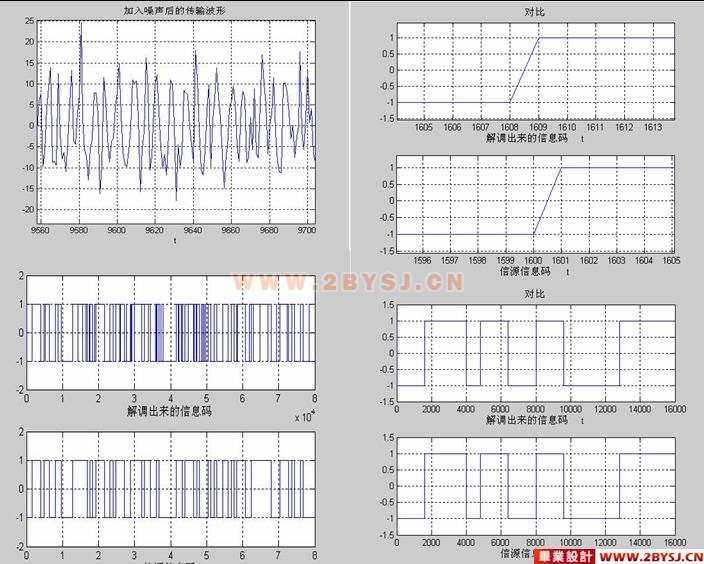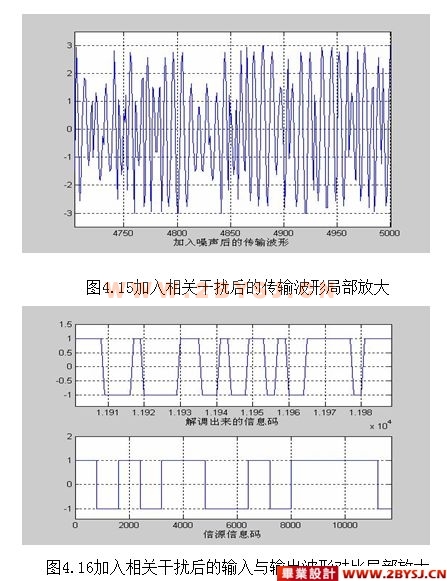直接序列扩频通信系统抗干扰技术研究
无需注册登录,支付后按照提示操作即可获取该资料.
摘 要
直接序列扩频通信系统由于其独特的抗干扰能力以及隐蔽性,在军事通信上获得了广泛的应用。直扩通信系统本身的抗干扰的能力与扩频增益成正比,但随着通信技术的发展可利用的频谱空间已经越来越有限,在复杂且不可预知的强电磁干扰下,靠提高扩频增益对干扰进行抑制的方法就显得有些不足了,并且在军事通信中还会受到敌方有意的强窄带干扰。这些人为干扰往往会超出接收机的干扰容限,将导致系统不能正常工作。因此,有必要采用信号处理技术对强窄带干扰进行抑制,以有效提高系统的性能。经研究表明,现已有的窄带抑制技术基本可分为两类:时域处理技术和变换域处理。基于时域的抑制技术能更彻底地抑制干扰,但收敛速度较慢,往往只能处理平稳时变信号;基于变换域的干扰抑制技术避免算法的收敛问题,可实时消除干扰,当干扰变化很块时,其优势明显。
关键词:直接序列扩频系统,抗干扰技术,仿真, direct sequence spread spectrum system(DSSS),Anti-jamming technology,Simulation
ABSTRACT
DS communication system because of its unique anti-jamming capabilities, and concealed in the military communications on access to a wide range of applications. Direct sequence spread spectrum communication system itself has strong anti-interference capabilities; the ability of its interference with the spreading gain is directly proportional. Now, with the development of communication technologies available spectrum space is increasingly limited! In the complex and unpredictable strong electromagnetic interference, spreading gain by raising the interference suppression methods it is stretched, And in military communications in the enemy's will be interested in the narrowband-interference, these man-made interference often exceed the receiver interference tolerance, the system will not work properly. Therefore, it is necessary to use signal processing technology to inhibit strong narrow-band interference, to effectively improve system performance. After years of study, has some basic narrowband suppression can be divided into two categories: time-domain processing technology and transform domain processing. Based on the time-domain suppression technology can more thoroughly suppress interference, but convergence is slow, often can only handle a smooth time-varying signal; domain based on the transformation of technology to avoid interference suppression algorithm for the problem of convergence, real-time to eliminate interference and interference when the changes are Block, its obvious advantages.
Key Words:direct sequence spread spectrum system(DSSS);Anti-jamming technology
;Simulation
直序扩频通信原理
原理是用伪随机编码序列去调制载波。由于一般所使用的伪随机序列速率远大于信码,所以经过调制以后,信号的能量被扩散到一个很宽的频带上,它的功率谱与噪声相似。在接收端,用与发送端同步的相同的伪随机序列解调接收信号,则最终有用信号可以恢复为窄带的中频信号,而干扰信号则仍然为宽带信号,在通过一个滤波器之后其大部分能量可被滤除。

目 录 18000字
摘 要 I
ABSTRACT I
引言 1
1、直序扩频概述 1
1.1扩频通信介绍 1
1.2直接序列扩频通信 2
1.2.1直序扩频定义 2
1.2.2直序扩频通信原理 2
1.2.3 直接序列扩频通信的特点 2
1.3直接序列扩频通信技术与其他扩频方式的比较 3
1.4 直接序列扩频系统的组成 3
1.5 直接序列扩频数字频带传输 5
1.5.1 数字相位调制 5
1.5.2 2PSK信号的解调 5
1.6直扩系统的性能分析 6
1.6.1扩频系统的抗干扰性能 6
1.6.2 系统的同步 6
1.7 直序扩频在工程中的实际应用 7
2、基于时域的处理技术 8
2.1时域预测技术基本原理 8
2.2抑制性能 8
2.3时域自适应线性预测滤波 9
2.4时域自适应非线性预测滤波 10
3、基于变换域的处理技术 12
3.1频域陷波技术 12
3.2小波包变换滤波技术 13
3.2.1小波包变换滤波技术技术简介 13
3.2.2小波包变换域自适应窄带干扰抑制接收机模型 14
4、MATLAB仿真 17
4.1直接序列扩频通信系统仿真 17
4.2 入噪声后的直扩系统仿真 21
4.2.1噪声调幅干扰 21
4.2.2噪声调频干扰 22
4.2.3通信中相关干扰 24
5、结论 27
致 谢 28
参考文献: 29
